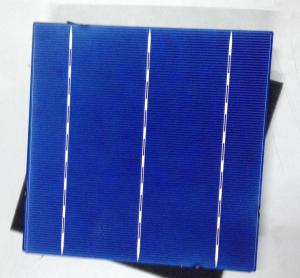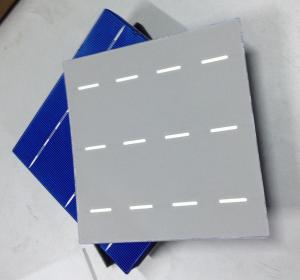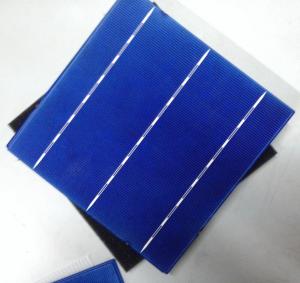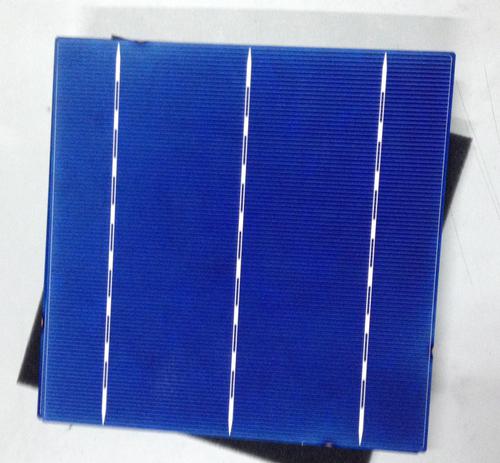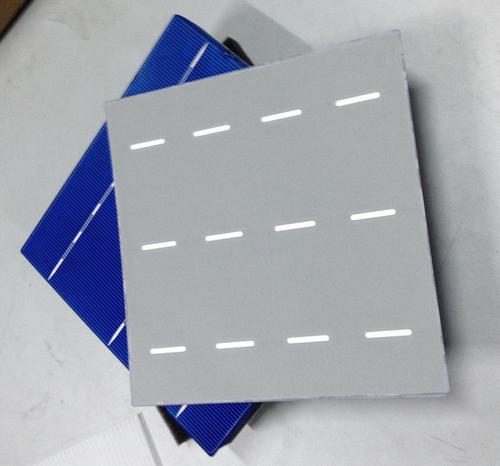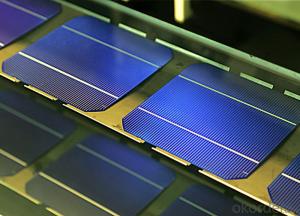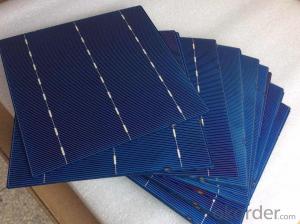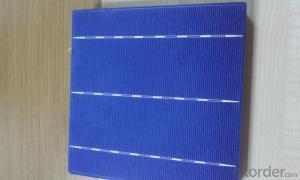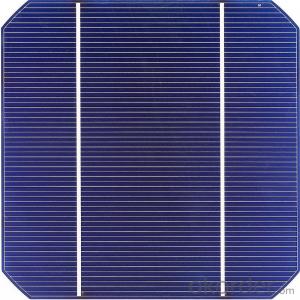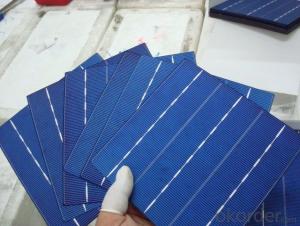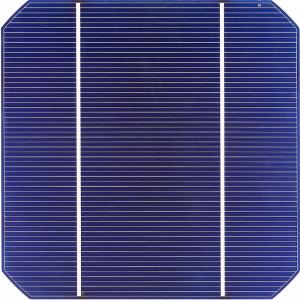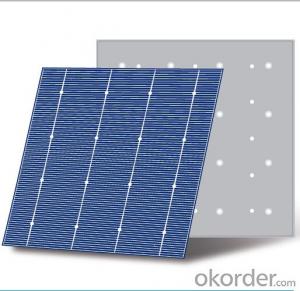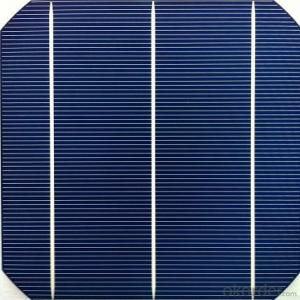Carbon Based Polycrystalline Solar Cells - Tire 1 Manufacturer
- Loading Port:
- Shanghai
- Payment Terms:
- TT OR LC
- Min Order Qty:
- 10000 pc
- Supply Capability:
- 50000000 pc/month
OKorder Service Pledge
OKorder Financial Service
You Might Also Like
Specifications of Poly Solar Cells
Format 156 mm × 156 mm ± 0.5 mm
Thickness- 210μm ± 40 μm
Front (-) 1.5mm bus bars (silver),blue anti-reflection coating (silicon nitride)
Back (+) 2.5mm wide soldering pads (silver) back surface field (aluminium)
Temperature Coefficient of Poly Cells
Voc.Temp .coef.%/K -0.351%/K
Isc.Temp .coef.%/K +0.035%/K
Pm.Temp. coef.%/K -0.47%/K
Electrical Characteristic of Poly Cells
| Efficiency | Efficiency | Pmax(W) | Average | Impp(A) | Vmpp(V) | Isc(A) | Voc(V) |
| 1720 | 17.20~17.40 | > 4.186 | > 4.186 | 7.94 | 0.528 | 8.515 | 0.626 |
| 1700 | 17.00~17.20 | 4.137~4.186 | 4.161 | 7.905 | 0.525 | 8.482 | 0.624 |
| 1680 | 16.80~17.00 | 4.088~4.137 | 4.113 | 7.863 | 0.521 | 8.402 | 0.623 |
| 1660 | 16.60~16.80 | 4.040~4.088 | 4.064 | 7.825 | 0.519 | 8.358 | 0.622 |
| 1640 | 16.40~16.60 | 3.991~4.040 | 4.015 | 7.769 | 0.517 | 8.304 | 0.621 |
| 1620 | 16.20~16.40 | 3.942~3.991 | 3.967 | 7.713 | 0.514 | 8.248 | 0.619 |
| 1600 | 16.00~16.20 | 3.894~3.942 | 3.918 | 7.67 | 0.511 | 8.204 | 0.616 |
Advantages of Poly Solar Cells
1. High efficiency and High power.
2. Long-term electrical stability.
3. Lowest price and Fastest delivery.
4. Good quality and good service.
5. Bulk supply
6. Good Warranty
7. Big Sale
8. More than 25 years on the lifetime.
Usage and Applications of Poly Cells
Solar cells are often electrically connected and encapsulated as a module. Photovoltaic modules often have a sheet of glass on the front (sun up) side, allowing light to pass while protecting the semiconductor wafers from abrasion and impact due to wind-driven debris, rain, hail, etc. Solar cells are also usually connected in series in modules, creating an additive voltage. Connecting cells in parallel will yield a higher current;our solar cells have passed IEC Certification. With high quality and stable quality. Our Cells can greatly improve the performance of Solar Modules.
Packaging & Delivery of Poly Cells
Carton Box Package and Deliver by air. It should be noticed that it should be avoid water, sunshine and moist.
FAQ
We have organized several common questions for our clients,may help you sincerely:
1. What’s price per watt?
A: It’s depends on the quantity, delivery date and payment terms of the order. We can talk further about the detail price issue. Our products is high quality with lower price level.
2. Can you tell me the parameter of your solar cells?
We have different series of cells with different power output, both from c-si to a-si. Please take our specification sheet for your reference.
3. How do you pack your products?
We have rich experience on how to pack the panels to make sure the safety on shipment when it arrives at the destination.
4. Can you do OEM for us?
Yes, we can.
5. How long can we receive the product after purchase?
In the purchase of product within three working days, We will arrange the factory delivery as soon as possible. The perfect time of receiving is related to the state and position of customers. Commonly 7 to 10 working days can be served.
Factory Picture
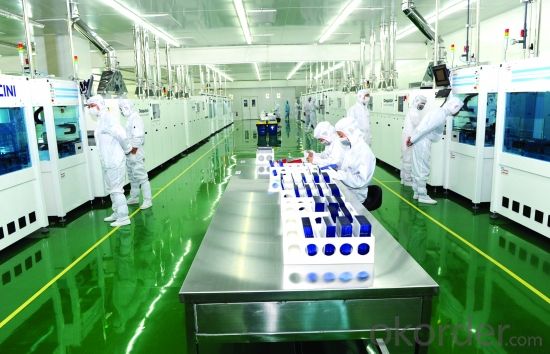
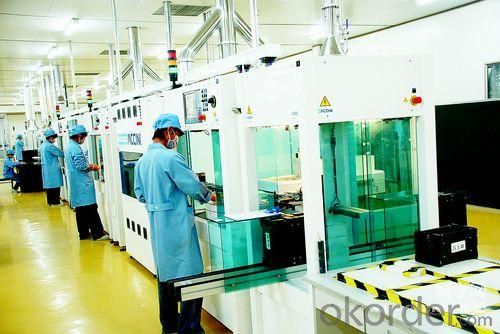
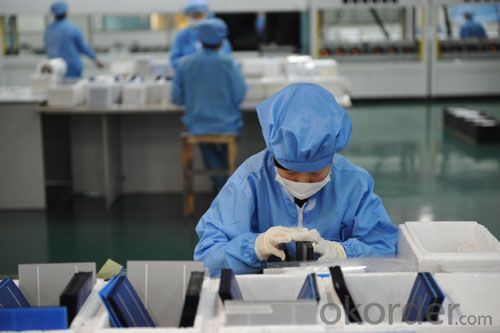
- Q: What is the role of trackers in solar cell systems?
- Trackers in solar cell systems are devices that help optimize the performance of solar panels by following the movement of the sun throughout the day. Their role is to ensure that the solar panels are always facing the sun at the optimal angle, maximizing the amount of sunlight they receive. This leads to increased energy production and improved efficiency of the solar cell system.
- Q: What is a High-efficiency electric solar cell panel?
- A high-efficiency electric solar cell panel is considered to be lor cost, high result based on it's performance running under certain circumistance. In this case, I think it should be the crystalline solar panel.
- Q: Can solar cells be used in off-grid systems?
- Yes, solar cells can definitely be used in off-grid systems. In fact, they are one of the most common and efficient sources of renewable energy for off-grid applications. Solar cells, also known as photovoltaic cells, generate electricity from sunlight and can be used to power various devices and systems in remote areas where there is no access to the electric grid. They are reliable, environmentally friendly, and can provide a sustainable energy solution for off-grid living or remote locations.
- Q: My solar cells are broken, can I just buy one and replace it?
- Trust me, you should hire a person who knows solar cells to help you.
- Q: What is the effect of dust or dirt on solar cell performance?
- The effect of dust or dirt on solar cell performance is that it reduces the amount of sunlight reaching the solar cells, thereby decreasing their efficiency and overall power output.
- Q: How do solar cells perform in areas with high humidity and saltwater exposure?
- Solar cells generally perform well in areas with high humidity and saltwater exposure. However, prolonged exposure to high humidity and saltwater can potentially degrade the performance and lifespan of solar cells. The humidity can cause moisture to accumulate on the surface of the solar panels, leading to reduced efficiency. Additionally, saltwater exposure can corrode the metal components of the solar cells, further impacting their performance. To mitigate these issues, manufacturers often use corrosion-resistant materials and coatings for solar panels deployed in coastal regions or areas with high humidity. Regular maintenance and cleaning can also help ensure optimal performance in such environments.
- Q: I have a turnkey solar power project starting in 6 months, now we are searching the market in south China to find the best solar cells manufacturers. Any professional suggestion or recommendation?
- In south China, you will have more resources than in north China, because there are many solar cell factories over there, which means you get to have more choice to select from.
- Q: Can solar cells be used to power remote sensing devices?
- Yes, solar cells can be used to power remote sensing devices. Solar cells convert sunlight into electricity, providing a reliable and sustainable source of power for remote sensing devices in areas where traditional power sources may be unavailable or impractical. This enables continuous operation of these devices, allowing for data collection and monitoring in remote locations.
- Q: How do solar cells work to become the solar energy?
- The solar cells need to work by converting a certain material into another useful energy. That's how we can utilize the solar energy into our life and factories.
- Q: Can solar cells be used for powering satellites?
- Yes, solar cells can be used for powering satellites. In fact, they are the primary source of power for most satellites in space. Solar cells convert sunlight into electricity, which is stored in batteries for use during periods of darkness or when the satellite is in Earth's shadow.
Send your message to us
Carbon Based Polycrystalline Solar Cells - Tire 1 Manufacturer
- Loading Port:
- Shanghai
- Payment Terms:
- TT OR LC
- Min Order Qty:
- 10000 pc
- Supply Capability:
- 50000000 pc/month
OKorder Service Pledge
OKorder Financial Service
Similar products
Hot products
Hot Searches
Related keywords
